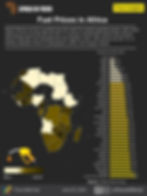Fuel Prices in Africa: A Deep Dive into the Disparities Driving the Pump Price
- bernard boateng
- Jun 30, 2025
- 2 min read
As of June 30, 2025, fuel prices across Africa present a revealing map of economic, geopolitical, and supply chain realities. From Libya's ultra-low gasoline price of $0.028 per liter to the Central African Republic's staggering $1.858, the range is not just wide, it’s systemic. Our latest Finex Insights visual explores the causes behind these disparities and what they reveal about Africa’s energy landscape.

North Africa: A Fuel Price Haven
Countries like Libya ($0.028), Algeria ($0.354), and Egypt ($0.38) boast the lowest prices on the continent. These nations are not only oil producers but also subsidize fuel for domestic consumption. North Africa's proximity to refineries, strong production infrastructure, and state policies have insulated consumers from global volatility.
Sub-Saharan Africa: Paying the Premium
In contrast, landlocked or import-reliant countries face significantly higher costs:
Central African Republic: $1.858
Senegal: $1.751
Zimbabwe: $1.543These prices reflect challenges in logistics, currency depreciation, and in some cases, heavy fuel taxes or subsidy cuts aimed at fiscal consolidation.
Middle Tier: Moderately Priced Markets
Countries like Nigeria ($0.586) and Sudan ($0.7), despite being oil producers, fall in the middle due to subsidy reforms, infrastructure issues, or refined fuel import dependencies.
Ghana and Kenya’s Position
Ghana ($1.386) and Kenya ($1.362) fall within the higher price band. This is due to a combination of fuel taxes, currency pressures, and the rising cost of imported refined fuel, despite being regional trade hubs.
What Drives the Price Gap?
Several factors determine fuel pricing:
Domestic oil production and refining capacity
Government subsidies or taxes
Exchange rate strength
Transport and import logistics
Political stability and fuel policy continuity
Fuel prices are more than just numbers at the pump, they’re reflections of a country’s energy independence, fiscal strategy, and political choices. As nations across Africa balance consumer welfare with economic realities, the variance in gasoline prices will continue to be both an economic and political story worth watching.
Stay tuned with Finex Insights as we continue to map the stories behind the numbers that shape African economies.
Source: Global Petrol Prices: https://www.globalpetrolprices.com/gasoline_prices/Africa, 23-Jun-2025